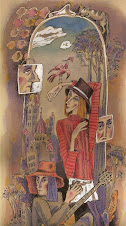How I Wrote What I Was Terrified To Write
Diana Spechler’s second novel, SKINNY, released on April 26th. It’s the story of a compulsive eater who takes a job at a weight-loss camp, and is forced to come to grips with herself, her father’s lies, and the half-sister she never knew existed. Diana has written for a variety of esteemed publications including the New York Times, GQ, and Esquire, and teaches writing in New York City. I’m thrilled she’s with us today to talk about writing what you know–and why it’s important. Enjoy!
How I Finally Wrote What I Was Terrified To Write
I used to deny that my writing was cathartic. Instead, I talked about it as if I spent my days coating plastics on an assembly line. “It’s work,” I always said. “It’s like any job.” But when I decided to write SKINNY, a novel exploring body image issues, I ran into trouble: How was I supposed to write about one of my worst pains without feeling it? I had struggled with body image issues since before I could remember. I have a vivid memory of being ten years old, sitting on a beach in a bathing suit, feeling a roll in my stomach, and wanting to cry. This was not assembly-line material. An emotion was bound to slip out.
Of course, I tried not to let that happen. I stopped and started the novel a million times because I was holding back, afraid to climb inside my protagonist’s head and experience her eating disorder. I didn’t want to watch her fantasize about ice cream sundaes, binge at an all-you-can-eat buffet, and use men as a stand-in for food. But if I didn’t do that, I didn’t have much of a character. And without that character, I didn’t have much of a story.
One day when I was complaining about how difficult the work was, my best friend, also a novelist, said something that freed me:
“I think you should remember that this is your story.”
Perhaps it sounds like a strange thing for one fiction writer to say to another, but fiction is, in a sense, nonfiction. That is, our characters can scale mountains, sprout wings, win baseball games, live on boats, live in dumpsters, live on Jupiter, or live three hundred years ago, but the emotions we make them experience are the ones we experience ourselves.
I’d been divorcing myself from my protagonist to shield myself from two things: the pain of real writing and the exposure that would accompany publication. But I wanted this book to be good, so I knew I had to lose the shield. And so, as I continued working on SKINNY, I began asking myself the same questions over and over:
1. Are you being honest?
2. Is your protagonist being honest?
3. Are you protecting your protagonist/yourself? (Stop it.)
4. If you didn’t have to protect yourself, what would you make her do/say?
5. Are you writing as if no one you know will read this? (You should be.)
Those questions got me through the first draft, the second draft, all the subsequent drafts, and everything I’ve written since. I have ended my job on the assembly line and begun my work as a writer.
When you’re writing fiction, the best gift you can give yourself and the work is honesty. Yes, writing SKINNY often caused me pain. But in the end, it turned out to be the good kind of pain, like the physical therapy I once did for a shoulder injury: It was pain that made everything better.
Thanks so much, Diana, for a great post! Readers, you can learn more about Diana’s compelling novel, SKINNY, by visiting Diana’s website and
author page at Harper Collins, and you can follow her on Twitter and Facebook. Write on!
I Left MAGA Host SPEECHLESS on CNN
5 weeks ago










3 comments:
Today doing a research on executive coaching, I have skimmed through various posts and found one of your's to best of my interest.Because you wrote your thought so descriptivly,Which is so nice way to write a post.for more info about the career cocahing you can visit : www.instituteforcoaching.com .
Post a Comment